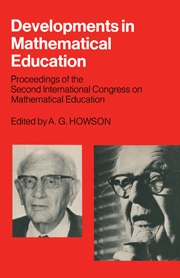 Developments in Mathematical Education
Developments in Mathematical Education Book contents
- Frontmatter
- Contents
- Editor's Acknowledgements
- PART I A CONGRESS SURVEY
- PART II THE INVITED PAPERS
- As I read them
- Comments on mathematical education
- The Presidential Address
- What groups mean in mathematics and what they should mean in mathematical education
- Nature, man and mathematics
- Some anthropological observations on number, time and common-sense
- Mathematical education in developing countries – some problems of teaching and learning
- Some questions of mathematical education in the USSR
- Modern mathematics: does it exist?
- PART III A SELECTION OF CONGRESS PAPERS
- Appendices
- Index
Comments on mathematical education
from PART II - THE INVITED PAPERS
- Frontmatter
- Contents
- Editor's Acknowledgements
- PART I A CONGRESS SURVEY
- PART II THE INVITED PAPERS
- As I read them
- Comments on mathematical education
- The Presidential Address
- What groups mean in mathematics and what they should mean in mathematical education
- Nature, man and mathematics
- Some anthropological observations on number, time and common-sense
- Mathematical education in developing countries – some problems of teaching and learning
- Some questions of mathematical education in the USSR
- Modern mathematics: does it exist?
- PART III A SELECTION OF CONGRESS PAPERS
- Appendices
- Index
Summary
The orientation one would consider giving to mathematical education depends naturally on the interpretation adopted of psychological development or the acquiring of operations and logico-mathematical structures; this interpretation depends equally on the epistemological meaning given to those things, the two questions of their psychogenesis and their epistemological significance being very closely related. If Platonism is right and mathematical entities exist independently of the subject, or if logical positivism is correct in reducing them to a general syntax and semantic, in both cases it would be justifiable to put the emphasis on the simple transmission of the truth from teacher to pupil and to use, as soon as possible, the language of the teacher, that is, the axiomatic language, without worrying too much about the spontaneous ideas of the children.
We believe, on the contrary, that there exists, as a function of the development of intelligence as a whole, a spontaneous and gradual construction of elementary logico-mathematical structures and that these ‘natural’ (‘natural’ in the way one speaks of the ‘natural’ numbers) structures are much closer to those being used in ‘modern’ mathematics than to those being used in traditional mathematics. There is, therefore, a body of facts which are, in general, little known to the teacher, but which, once he has a better psychological knowledge, would be of considerable use to him and would help him rather than make things more complicated. This would also favour the realisation of creative vocations in pupils rather than treating them simply as conforming ‘receiving’ instruments.
- Type
- Chapter
- Information
- Developments in Mathematical EducationProceedings of the Second International Congress on Mathematical Education, pp. 79 - 87Publisher: Cambridge University PressPrint publication year: 1973
- 24
- Cited by
